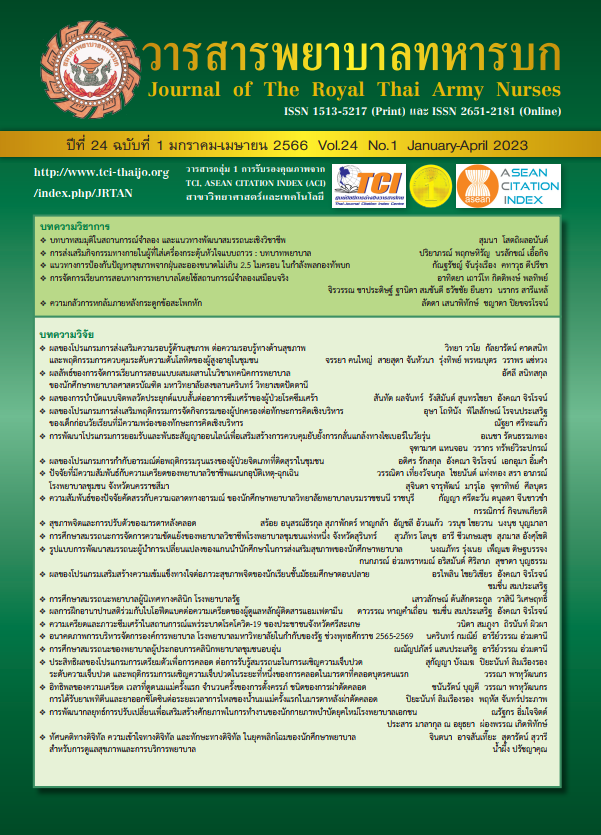A Study of Opthalmic Nurse Competency, Government University Hospital
Keywords:
Ophthalmic nurse competency, government university hospitalAbstract
The purpose of this research was to describe the ophthalmic nurse competency based on career ladder, government university hospital, using Ethnographic Delphi Future Research (EDFR) technique. Participants were 19 eye experts including physicians, nursing administrators, advanced practice nurses, staff nurses and professors. The research design: all experts were asked to describe the functional competency of ophthalmic nurse, government university hospital. The data were analyzed by using median and interquartile range to summarize competency.
The result of the study presented that the ophthalmic nurse competency based on career ladder were classified in to 4 components as follow 1) Ophthalmological nursing 2) Risk management 3) Providing information and counseling 4) Quality improvement
The competency of nurses in each level has the same major competency but different detail as
follows:
Nurse level 1 Provides nursing care at a basic level.
Nurse level 2 Provide specialized eye care in patients with no complex problems.
Nurse level 3 Applies advanced knowledge for caring complicated eye patients.
Nurse level 4 Create ophthalmic nursing research and innovations.
Nurse level 5 Able to be a good model in specialized eye nursing care and develop ophthalmic nursing research and innovations.
Downloads
References
Bureau of Policy and Strategy, Ministry of Public Health. Strategies, Indicators and Guidelines for Data Storage. Ministry of Public Health Fiscal Year 2014. 2014.
Social Security Fund Office Social Security Office Ministry of Labor. Statistics on the occurrence of hazards or work-related illnesses classified by severity and causes of harm, 2013. 2013.
Sripaisal, S. Nursing care for ophthalmic patients. Bangkok: Thammasat University; 2002. (in Thai).
Royal College of Nursing. The nature, scope and value of ophthalmic nursing. London: RCN; 2009.
Smith, S. Management of client with visual disorders. Singapore: Elsevier Inc; 2009.
The Nursing Department, MaharajNakorn Chiang Mai Hospital. The professional nurse competency assessment tool. Chiang Mai, Thailand: Faculty of Medicine, Chiang Mai university; 2010. (in Thai).
Kerdchuchern K and Rimsritong S. The nursing of ophthalmology. 1st ed. Bangkok, Thailand: Faculty of Medicine Ramathibodi Hospital, Mahidol university; 1996. (in Thai).
Benner P. From novice to expert: Excellence and power in clinical nursing practice. California: Addison-Wesley; 1984.
Pulpattarachewin, J. The ethnographic delphi future research. Bangkok, Thailand: Chulalongkorn Publishing; 1996. (in Thai).
Department of Nursing. Nursing care standards. Nonthabury, Thailand: Department of Medical Services Ministry of Public Health;2006.
Rimsritong, S. Nursing care for adults and the elderly. Bangkok, Thailand: Faculty of Medicine Ramathibodi Hospital, Mahidol university; 2015. (in Thai).
Prain, A. Development of an ophthalmic nursing competency framework of professional nurses, Lamphun hospital. Chiang Mai university; 2011. (in Thai).
Nursing Council. Professional Nursing and Midwifery Act, and amended by the Nursing and Midwifery Profession Act (No.2). Bangkok,Thailand: Nursing Council; 2009.
Nantsupawat A, Sathapornpat P. Competency and Role of Health Promotion among Nurses in Tertiary Hospital. Journal of The Royal Thai Army Nurses. 2017; 18(1): 222-28. (in Thai).
Downloads
Published
How to Cite
Issue
Section
License
Copyright (c) 2023 Journal of The Royal Thai Army Nurses

This work is licensed under a Creative Commons Attribution-NonCommercial-NoDerivatives 4.0 International License.
บทความหรือข้อคิดเห็นใดใดที่ปรากฏในวารสารพยาบาลทหารบกเป็นวรรณกรรมของผู้เขียน ซึ่งบรรณาธิการหรือสมาคมพยาบาลทหารบก ไม่จำเป็นต้องเห็นด้วย
บทความที่ได้รับการตีพิมพ์เป็นลิขสิทธิ์ของวารสารพยาบาลทหารบก
The ideas and opinions expressed in the Journal of The Royal Thai Army Nurses are those of the authors and not necessarily those
of the editor or Royal Thai Army Nurses Association.






